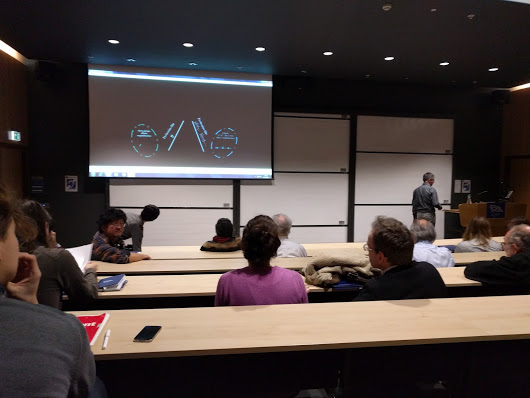
The extensive press coverage of the inconclusive conclusion of the Oxford conference on Inter-Universal Teichmüller theory, including excellent articles by Kevin Hartnett in Quanta and Davide Castelvecchi in Nature, as well as a shorter account by Jacob Aron in New Scientist, should signal the opening of a new era in the sociological study of consensus formation in mathematics. The standard reference for such matters is Claude Rosental’s Weaving Self-Evidence: A Sociology of Logic, which traces the history of the controversial reception of a theorem on the foundations of fuzzy logic. To quote the book’s jacket:
Rosental’s analyses disclose the inherently social nature of the process by which propositions in logic are produced, disseminated, and established as truths.
The plural “truths” that ends Rosental’s sentence about logic is a coded way of insisting, in keeping with the principles of Sociology of Scientific Knowledge (SSK), that truth is not unique, eternal, and incontrovertible but is rather established through a process of social negotiation. In other words, as Christian Greiffenhagen wrote in his review,
Rosental’s study is firmly in the line of ‘controversy studies’ that attempt to show how the content of scientific knowledge is (at least partially) socially determined in so far as controversies are not settled by the logical implications of scientific experiments alone.
Rosental’s case study centers on a paper by Charles Elkan that purported to prove that fuzzy logic is either inconsistent or reduces to classical logic, and the fact that Elkan’s proof made implicitly use of the law of the excluded middle, which is specifically not a law in fuzzy logic. To quote Greiffenhagen again:
Rosental could be said to show that it does not seem possible to construct fully explicit mathematical proofs that will be self-evident to every reader (i.e., that proofs do not always settle arguments, even in logic).
The controversy Rosental chose to examine is marginal to the interests of what I would like to argue is the mathematical mainstream, and is in any case a fragile basis on which to generalize about mathematical practice. From the perspective of MWA, Rosental’s argument belongs not to the sociology of mathematics but rather to the sociology of Mathematics, where the latter is a hypothetical rational reconstruction of the former, by certain philosophers, that turns out to be made to order to serve as a punching bag for SSK but in most respects bears little relation to the concerns of practicing mathematicians. In contrast, mathematicians are wildly interested in the ABC Conjecture. Journalists have already provided the raw materials for a comprehensive sociological study. The articles of Hartnett and Castelvecchi both highlighted the importance of social media, specifically Felipe Voloch’s Google+ posts, in creating an immediate historical record (what SSK theorists might call an inscription) of the Oxford proceedings. Hartnett obtained the following authoritative quote from Gerd Faltings:
[I] got the impression that unless Mochizuki himself writes a readable paper, the matter will not be resolved.
The Nature article even contributed inadvertently to its own sociological deconstruction, by provoking a dissenting opinion on the part of Ivan Fesenko, one of the organizers of the event, which in turn provoked David Hansen’s dissent from the dissent:
“There are no questions about the theory which are left unanswered.” This seems like an absurd statement.
————————————————————————————————
Image from Felipe Voloch, Google+

Pingback: Updates | Not Even Wrong
The ABC Affair has certainly been fascinating to follow as a historian, and how one follows these things has transformed dramatically in the last decade—so much so that certain aspects of the current situation are recognizable from any of a number of recent community efforts by mathematicians to make sense of an asserted breakthrough proof. (Terry Tao makes this especially accessible: think of his work organizing refinements of Bounded Gaps and helping debunk a recent P/NP claim.)
Rosental’s book is definitely worth reading for any readers of this blog interested in the sociology of proof; incidentally, when I went to grab it off my bookshelf I saw that it had wound up filed right next to MWA. But it’s not accurate to boil it down to SSK or vice versa. Greiffenhagen’s review does a good job of setting the scene for those wishing for more context. And the sociology has developed alongside debates among mathematicians themselves. Take a line from a famous paper of De Millo, Lipton, and Perlis from around the same time SSK was hitting the scene: “The proof by itself is nothing; only when it has been subjected to the social processes of the mathematical community does it become believable.”
LikeLike
Painful memories reawakened! I remember the “Fuzzy Logic is inconsistent” discussion from IEEE Micro back when Fuzzy Logic was the new fad. I thought that discussion would be more appropriate coming from the freshman corner in cafeteria. As if there was only One True Logic. I have a book here on my desk which lists about 10 different ones (and that’s just for starters) … which is just normal, a logic is a Turing Machine, after all. Go wild with the logics, as long as it conforms to the desired semantics.
LikeLike
That’s why I don’t think the controversy in Rosental’s book sheds much light on the really interesting controversies in mainstream mathematics.
LikeLike